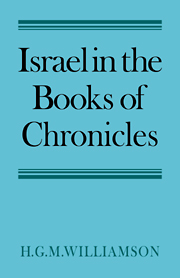Book contents
- Frontmatter
- Contents
- Foreword
- List of Abbreviations
- 1 Introduction
- PART ONE The Extent of the Chronicler's Work
- PART TWO The Concept of Israel in the Books of Chronicles
- 7 1 Chronicles 1–2 Chronicles 9
- 8 The Divided Monarchy (2 Chronicles 10–28)
- 9 Hezekiah to the Babylonian Exile (2 Chronicles 29–36)
- 10 Conclusions
- Bibliography
- Index of Passages Cited
- Index of Modern Authors
- General Index
7 - 1 Chronicles 1–2 Chronicles 9
Published online by Cambridge University Press: 26 February 2010
- Frontmatter
- Contents
- Foreword
- List of Abbreviations
- 1 Introduction
- PART ONE The Extent of the Chronicler's Work
- PART TWO The Concept of Israel in the Books of Chronicles
- 7 1 Chronicles 1–2 Chronicles 9
- 8 The Divided Monarchy (2 Chronicles 10–28)
- 9 Hezekiah to the Babylonian Exile (2 Chronicles 29–36)
- 10 Conclusions
- Bibliography
- Index of Passages Cited
- Index of Modern Authors
- General Index
Summary
GENERAL USES AND THE PRE-MONARCHIC PERIOD
Of the 300 occurrences of the name Israel in Chr., we have already noted that twelve refer to the patriarch Jacob (above, p. 62), a possible indication of the Chronicler's view that Israel was expressed through the full twelve tribes.
Thirty-five times the word is used in the expression ‘(the Lord) the God of Israel’, and twenty-one times it is used for the corresponding idea that Israel is his people.
Finally, the Chronicler uses Israel twenty-seven times to refer to various aspects of the period prior to the monarchy, and shows thereby his knowledge of all the main Israelite traditions for that early period.
Whilst most of these references are insignificant in the present context, they include one passage that deserves more detailed attention: in 1 Chr. 5: 1–2, the Chronicler explains why he has not listed Reuben first in his genealogies of the tribes of Israel, and further why Judah, not Joseph (as might apparently have been expected), is given that place of honour:
And the sons of Reuben the firstborn of Israel, (for he was the firstborn; but, forasmuch as he defiled his father's couch, his birthright was given to the sons of Joseph the son of Israel; and the genealogy is not to be reckoned after the birthright. For Judah prevailed above his brethren, and of him came the prince; but the birthright was Joseph's:) …
- Type
- Chapter
- Information
- Israel in the Books of Chronicles , pp. 89 - 96Publisher: Cambridge University PressPrint publication year: 1977



